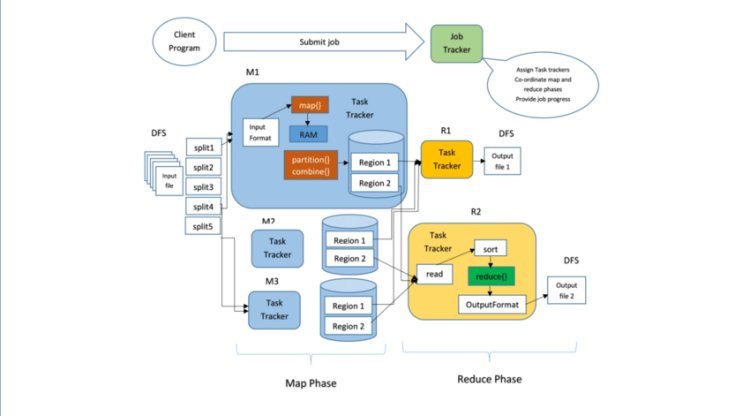Hadoop 4.0: The Future of Big Data Processing is Here
Big Data and Hadoop: Transforming Business Operations in 2023"

What is Big Data?
Big data refers to extremely large and complex datasets that cannot be effectively processed or analyzed using traditional data processing methods. These datasets can come from a variety of sources, such as social media, sensors, financial transactions, and more.
Big data is characterized by the "three V's": volume, velocity, and variety. The volume of data is massive, with terabytes or even petabytes of data being collected and processed. The velocity of data is also high, with new data being generated and collected in real-time. Finally, the variety of data is diverse, with structured and unstructured data coming from various sources.
To process and analyze big data, specialized tools and technologies are needed. These include distributed systems such as Hadoop and Apache Spark, as well as programming languages such as Python and R. Machine learning and artificial intelligence are also commonly used to make sense of big data and extract insights from it.
The insights gained from analyzing big data can have significant impacts in various fields, such as business, healthcare, and government. For example, businesses can use big data to understand customer behavior and preferences, optimize operations, and make better decisions. In healthcare, big data can be used to improve patient outcomes, reduce costs, and accelerate research. In government, big data can be used to improve public safety, enhance disaster response, and improve public services.
Overall, big data represents a significant opportunity for organizations to gain valuable insights and make data-driven decisions that can lead to improved outcomes and competitive advantages.
"Big Data and Hadoop: Transforming Business Operations in 2023"
Big data and Hadoop are transforming the way businesses operate in 2023. As companies continue to collect massive amounts of data from various sources, they need effective ways to store, process, and analyze it. Hadoop is a powerful tool that can handle the massive volumes of data generated by businesses and turn it into valuable insights.
One of the main ways that big data and Hadoop are transforming business operations is by enabling better decision-making. By analyzing data from various sources, businesses can gain insights into customer behavior, market trends, and operational inefficiencies. This information can be used to optimize operations, improve customer experiences, and increase profitability.
Another way that big data and Hadoop are transforming business operations is by enabling more efficient data processing. Hadoop's distributed architecture allows businesses to process large amounts of data quickly and at a lower cost than traditional data processing methods. This can help businesses save time and money and make data processing more accessible to organizations of all sizes.
Additionally, big data and Hadoop are transforming business operations by enabling more accurate predictions and forecasting. By analyzing historical data, businesses can identify patterns and make predictions about future trends. This can help businesses make more informed decisions about product development, pricing, and marketing.

Hadoop 4.0: "The Future of Big Data Processing is Here"
Hadoop 4.0 is the latest version of the Apache Hadoop framework, and it represents the future of big data processing. With Hadoop 4.0, businesses can process and analyze massive amounts of data more efficiently and effectively than ever before.
One of the key features of Hadoop 4.0 is enhanced performance and scalability. The new version of Hadoop is designed to handle even larger volumes of data and perform faster processing. This means businesses can process and analyze data in near-real-time, enabling them to make faster and more informed decisions.
Another major feature of Hadoop 4.0 is improved security. The new version of Hadoop includes enhanced security features, such as encryption and access controls, to ensure that data is protected against unauthorized access and breaches. This is especially important as data privacy concerns continue to grow in importance.
Hadoop 4.0 also includes new tools and technologies for data processing and analysis. For example, the new version includes improved machine learning capabilities, which can help businesses uncover insights and patterns in their data that were previously hidden. It also includes new data governance and management tools, making it easier for businesses to manage and control their data.
Overall, Hadoop 4.0 represents a significant step forward in the world of big data processing. With enhanced performance, improved security, and new tools and technologies, businesses can process and analyze massive amounts of data more efficiently and effectively than ever before. As the volume of data continues to grow, Hadoop 4.0 will become an increasingly important tool for businesses looking to gain insights and value from their data.
"Hadoop vs. Other Big Data Technologies: Which One is Right for Your Business?"
When it comes to big data processing and analysis, Hadoop is just one of many technologies available to businesses. While Hadoop is a powerful and popular tool, it's important to consider whether it's the right choice for your business. Here's a look at Hadoop vs. other big data technologies and factors to consider when choosing the right tool for your needs.
Apache Spark: Like Hadoop, Apache Spark is an open-source big data processing tool. However, Spark is designed to be faster and more efficient than Hadoop, making it a better choice for businesses that need to process large volumes of data quickly.
NoSQL databases: NoSQL databases are designed to handle unstructured and semi-structured data, making them a good choice for businesses that need to process and analyze data from a variety of sources. However, they may not be as well-suited to handling massive volumes of data as Hadoop.
Data warehousing: Data warehousing involves storing data in a central repository for easy access and analysis. While this approach can be efficient for certain types of data, it may not be the best choice for businesses that need to process and analyze massive volumes of data.
Cloud-based solutions: Cloud-based big data solutions, such as Amazon Web Services and Google Cloud Platform, can provide businesses with the scalability and flexibility they need to process and analyze large volumes of data. However, they may not be as cost-effective as on-premise solutions like Hadoop.
When choosing between Hadoop and other big data technologies, it's important to consider your business's specific needs and goals. Factors like the volume of data you need to process, the complexity of the data, and the speed at which you need to process it can all play a role in determining which tool is right for you. Ultimately, the right choice will depend on a variety of factors and will vary from business to business.
"How Hadoop is Revolutionizing Healthcare Analytics and Research"
The healthcare industry generates a massive amount of data every day, from patient records to clinical trials and research studies. To make sense of this data and uncover insights that can improve patient outcomes, healthcare organizations are increasingly turning to big data tools like Hadoop.
One of the key ways that Hadoop is revolutionizing healthcare analytics and research is by enabling the analysis of massive amounts of data. With Hadoop, healthcare organizations can process and analyze data from a variety of sources, including electronic health records, medical imaging data, and genomic data, to uncover patterns and insights that were previously hidden.
Hadoop is also helping to drive innovation in healthcare research. For example, researchers are using Hadoop to analyze massive amounts of genomic data to identify new treatments and personalized therapies for patients. Hadoop is also being used to analyze data from clinical trials and studies, enabling researchers to identify trends and patterns that can inform the development of new treatments and therapies.
Another area where Hadoop is making a big impact in healthcare is in fraud detection and prevention. Healthcare fraud is a major issue, and Hadoop is helping to identify and prevent fraudulent activities by analyzing massive amounts of data to uncover patterns and anomalies that may indicate fraud.
What's Your Reaction?















